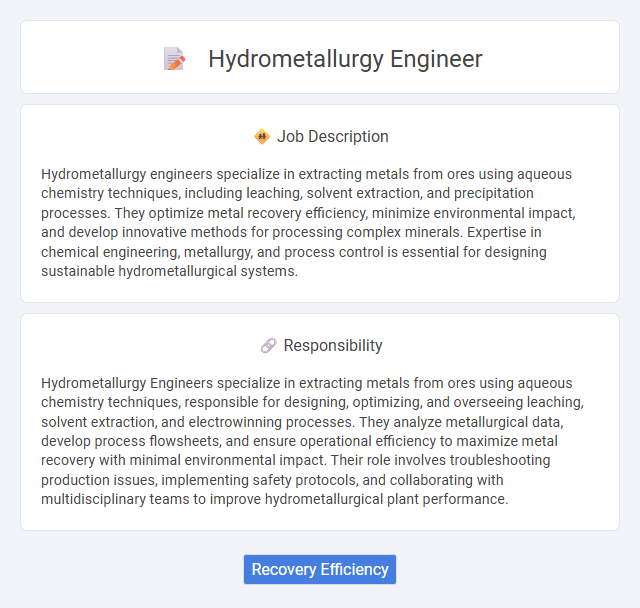
Hydrometallurgy engineers specialize in extracting metals from ores using aqueous chemistry techniques, including leaching, solvent extraction, and precipitation processes. They optimize metal recovery efficiency, minimize environmental impact, and develop innovative methods for processing complex minerals. Expertise in chemical engineering, metallurgy, and process control is essential for designing sustainable hydrometallurgical systems.
Individuals with strong analytical skills and a passion for chemistry are likely to find hydrometallurgy engineering rewarding, as the role involves processing metals using aqueous chemistry methods. Candidates comfortable with laboratory work, data analysis, and problem-solving under controlled conditions may adapt well to this field. Those who prefer hands-on industrial processes combined with environmental considerations would probably be suited to a hydrometallurgy engineer position.
Qualification
Hydrometallurgy Engineers typically require a bachelor's degree in metallurgical engineering, chemical engineering, or materials science, with many roles preferring a master's degree or specialization in hydrometallurgical processes. Proficiency in chemical extraction methods, process design, and environmental regulations, as well as experience with mineral processing and solvent extraction technologies, are essential qualifications. Strong analytical skills, knowledge of laboratory techniques, and familiarity with industry software such as metallurgical simulation and process modeling further enhance job performance and career advancement.
Responsibility
Hydrometallurgy Engineers specialize in extracting metals from ores using aqueous chemistry techniques, responsible for designing, optimizing, and overseeing leaching, solvent extraction, and electrowinning processes. They analyze metallurgical data, develop process flowsheets, and ensure operational efficiency to maximize metal recovery with minimal environmental impact. Their role involves troubleshooting production issues, implementing safety protocols, and collaborating with multidisciplinary teams to improve hydrometallurgical plant performance.
Benefit
Hydrometallurgy engineers likely experience competitive salaries due to their specialized skill set in metal extraction using aqueous solutions. The role probably offers opportunities for career growth within mining, chemical, and environmental sectors as demand for sustainable metal recovery increases. Benefits may also include working on innovative projects with a focus on eco-friendly technologies, potentially providing job satisfaction and industry relevance.
Challenge
Hydrometallurgy engineers likely face complex challenges related to optimizing metal extraction processes from ores using aqueous chemistry under varying operational conditions. The role probably demands solving problems linked to chemical reactions, material recovery rates, and environmental compliance to enhance efficiency and sustainability. Addressing these challenges may require innovative approaches and continuous adaptation to advances in metallurgical technology.
Career Advancement
Hydrometallurgy engineers specializing in the extraction and processing of metals using aqueous chemistry techniques experience significant career advancement opportunities in mining and metallurgical industries. Mastery of process optimization, leaching, solvent extraction, and metal recovery techniques can lead to roles such as senior process engineer, project manager, or research and development specialist. Continuous upskilling in emerging technologies and sustainability practices enhances prospects for leadership positions and influence on innovative metal recovery solutions.
Key Terms
Recovery Efficiency
Hydrometallurgy engineers specialize in optimizing recovery efficiency by designing and implementing chemical processes to extract valuable metals from ores using aqueous solutions. They analyze process parameters such as leaching, solvent extraction, and electrowinning to maximize metal yield and minimize reagent consumption. Advanced techniques like pressure leaching and bioleaching are applied to enhance recovery rates, reduce environmental impact, and improve overall cost-effectiveness in metal recovery operations.
 kuljobs.com
kuljobs.com